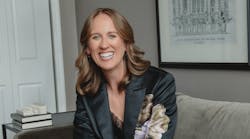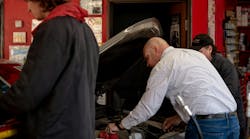Right off the showfloor of Freedom Toyota sits Evelyn Chatel’s office. It’s all glass and employees of the Harrisburg, Pa., dealership can be seen walking in and out of that office all day long—even utilizing the space when Chatel isn’t there. But when she is there, the general manager is doing one thing: asking questions. Her office even has a physical reminder of this important practice: The wallpaper is patterned with question marks in different sizes and colors.
“I’ve done this 36 years,” Chatel says. “It’s not my first barbeque. I’ve seen or heard most of the problems that come my way and it’s easy for me to say, ‘This is the way to fix it.’ I still have to make sure I remind myself, that doesn’t help people learn or fix the problem. Figure out what questions to ask and get them there instead.”
That predilection for asking questions has been a key to Chatel’s success since she started in the business as an 18-year-old service drive greeter. But it became even more important in 2006 when she and her business partner, Eric Savage, decided to open Freedom Toyota.
“Eric’s vision for what this business could be aligned with me: First and foremost, you take care of your people. Then they will take care of the customer,” she says. “If you take care of the customer, it will take care of the business. It’s a perfect alignment.”
Now, Chatel can already guess your next question: What does that actually look like?
Good question, she says; that’s exactly what Chatel and Savage set out to answer when they created their dealership’s mission statement for the first time seven years ago.
Here’s where Chatel’s love of questions comes into play: Instead of dictating that mission statement from the top down, the owners instead split their team of 250 employees into groups of 20 and put them in a room with a third-party facilitator. The facilitator peppered the groups with questions: What’s important to you? What are the things you need to have at work? They did the same exercise with the managers and the executive team.
"The facilitator collected all the information and said, ‘This is really scary. Every group had the same five words,” Chatel says.
Those five words eventually became the foundation of REACH, the dealerships’ mission statement, which stands for results, enthusiasm, accountability, connection and honesty. It’s the foundation to everything the dealership does, and has allowed Chatel to strategically lead the team into becoming one of the largest operations in the area.
“I can go tell people what to do but if I ask questions that inspire them to figure it out, they take ownership. You find out more about what’s going on in your business,” she says. “Asking questions and being curious has always worked for me. For two reasons: One, I got the information, and two, I got people to think for themselves and solve problems.”
R: Results
The first component of Freedom Toyota’s mission statement is “results”—and it has nothing to do with money.
“Not one person put, ‘I have to have money,’” Chatel says. “They put things like, ‘I need to pay for my house, pay for my children’s college.’ That’s a matter of results. If you have results, you can do all of those things. It’s not about money, it’s about, ‘I expect to be treated well and this is what I need for it.’”
What came out of that conversation, instead, was the need for results. Employees wanted to feel proud of what they accomplished and wanted to know how they stacked up. That’s why Chatel and her team decided to implement metrics that explicitly indicated employees’ performance—good or bad. Employees wanted to know their performance and their outcome, regardless of what it said.
Those metrics have been key to both the success of the existing stores, but also the strategy of expanding and acquiring dealerships. Freedom Auto Group began with a Toyota and Hyundai store and then acquired an additional Toyota store. The growth has been deliberate and, at times, deliberately slow.
"When you have a very set culture and you know what you want and you’re clear, when you go in and buy a store and try to do that, not everyone buys in,” she says.
By having such clear metrics, any outliers can be identified quickly.
“But in a [training] environment, you stick out like a sore thumb,” Chatel says. “You can’t be a lone ranger. You can’t be about ‘me.’”
Here’s an example: Chatel has had 30-unit salespeople (or “life improvement specialists,” as the dealership calls them) that were phenomenal salespeople but simply didn’t care about the customers.
"Every customer we serve, we send a handwritten thank-you letters,” he says. “I don’t know too many people that will let a 30-unit guy go. And it wasn’t just one; it was a couple. They didn’t believe that this is a relationship business. We’re in the life improvement business. I’m building relationships with customers. Some people don’t understand that environment. They thought, ‘You guys will get over it; profit and money is more important.’ It’s not. We’re in servant leadership.”
E: Enthusiasm
Chatel distinctly remembers the first customer she sold a job to as a service advisor. The customer drove a Honda Accord and Chatel told him, “Your brakes blew up.” All the service advisors burst out laughing at her lack of knowledge, but the customer bought the job—all of it.
“When he came to pick up his car, he said, ‘Now, listen, I bought it because you were so nice and so happy to take care of me. That’s why I bought the job. But brakes don’t blow up.’ Then he gave me a $100 bill,” she says.
That $100 bill still sits framed in Chatel’s office and serves as a reminder of this critical component of the mission statement: enthusiasm.
“I love it because he knew that it was not about the job. He needed the job. He knew it was about the experience,” she says. “I remember thinking, ‘This is awesome. If I give great experiences, if I make this a positive experience, then they can forgive you for not knowing everything.’ That’s when I said, ‘I’m not leaving this business.’”
Of course, living and breathing “enthusiasm” is easier said than done. That’s where communication becomes vital.
“I’m constantly walking the floors, in the showroom, in the service drive,” Chatel says. “Communication is how you live and breathe it. I’m not a social media person. I’m the most technically deficient person I know. But as soon as someone gets hired, I go on Facebook and add them. What I find is that I find out a lot about their people by their posts. They had a baby, they went to their grandkid’s baseball games. I saw that he hit his first home run; that’s awesome!
“I’m Cuban,” Chatel adds with a laugh. “If my day isn’t overflowing with laughter, it’s not a great day.”
A: Accountability
Hand in hand with “results” comes accountability, Chatel says. The bottom line for employees is they wanted their colleagues to do their jobs properly and not create more work for themselves.
And it’s with that sentiment in mind that the ACT program was founded, a 17-week program through which every employee goes. The acronym stands for Accountability, Communication and Trust and the program is singularly focused on giving employees the tools to learn how to be accountable, communicate and trust each other.
“If I take two people from two different cultures or backgrounds and I put them in the parts department together and they have to work together, it might not work very well,” Chatel says. “The ACT program helps our employees understands that different people are going to bring different cultures and environments. The program allows our people to spend time together and learn.”
The initial program is one hour per week and every single employee goes through it. In fact, it’s been so successful that Chatel says she’s had employees come up to her and say they’ve used the tactics on family relationships to similar success.
After the initial program, there’s also a post-ACT program, where, once per month, an employee is picked to lead a meeting where he or she chooses one of the topics from the program and covers it. It could be an exercise or an ice breaker, but the point is that the entire team goes through the concept together and those initial principles are reinforced on a monthly basis.
At the beginning of 2018, the dealership relaunched the program after sending all of its managers to a facilitation school so that those managers could run the program.
“Everyone will go through it again. We’re constantly trying to get better and better at that accountability,” Chatel says. “Now we went through it and we said [to the managers], 'Now teach it.' That's what makes the difference."
C: Connection
When presented with the opportunity to open her own dealership, Chatel knew she wanted giving back to be at the core of the operation. Upon opening that first year, she decided to host a dinner for families in need; the staff fed five families.
Ten years later and the program, now called Holiday Helpers at Christmas, fed more than 900 people this year, gave away clothing to those who needed it, and had stations inside the dealership with crafts and games for the kids.
“For me, it’s a non-negotiable. Both my parents worked in factories all my life. We arrived in the U.S. and were given a box of welfare. I know what it’s like on the other end of the receiving line. That’s why, it’s necessary to give back,” Chatel says. “I was having a really bad day the other day and was going to event to give 200 boots to children. I got there and I was handing this mom some boots, and she said, ‘We’ve been putting plastic in our daughters’ shoes because they were worn out.’ You cannot explain the overwhelming feeling of gratitude for everything you have when you’re put in those situations.”
Beyond the Christmas event, the dealership donated roughly $250,000 to non-profits in 2017 alone. Employees are paid for any community hours they volunteer and if they choose to donate to any non-profit, the dealership will match that donation on their behalf. As a result, a significant number of employees serve on boards for various non-profits in the community. In December, the dealership hosts its Freedom Giving Thanks, where eight non-profits are chosen to receive $5,000 each from the dealership. This year, those organizations included a suicide hotline, dog shelter, and coloring books for children with cancer.
“We don’t do it for recognition. We don’t even publicize the Freedom Giving Thanks. Those are things we do because it’s the right thing to do. For us, how do you repay that?”
Beyond being a steward in the community, the charitable giving has made a difference in the dealership atmosphere, as well.
“I live and breathe by this one. It’s about having a connection with my people,” Chatel says. “Because when that happens, when you get to that level, [the employees] will do anything. Anybody will do anything for each other. I have to know about your kids. I have to know how your garden is doing. I have to know if your mom is still sick or better. That builds team. Otherwise, I just have a connection to a paycheck and that’s not rewarding.”
H: Honesty
“I have a saying,” Chatel says. “If the baby is ugly, the baby is ugly.”
How’s that for honesty? That’s exactly the type of straight shooter that Chatel is.
“I will always tell you what’s on my mind,” she says. “You’ll never have to guess or beat around the bush. You’ll get exactly what it is. It’s not something that’s one way.”
That honesty is ever-present throughout the dealership, whether it be the language used in the service interactions, the relationship building that occurs with customers or the monthly potlucks where the staff gets together to eat, share birthdays and anniversaries and is recognized for exceptional efforts. That’s the tricky part of honesty, Chatel says; you have to be honest in both positive and, at times, negative ways and ensure that a balance between the two is always struck. If that’s done well, however, she says it can lead to a family atmosphere that’s not only a more pleasant place to work, but also tends to be immediately obvious to customers.




